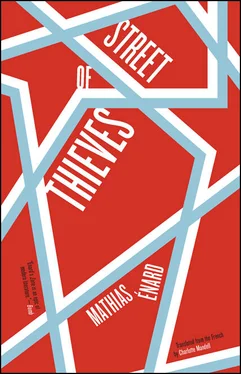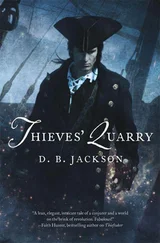Like those soldiers in 1914, who left their villages or douars without knowing what was awaiting them, on September 21, 2011, I boarded the Ibn Battuta, a ferry belonging to the Comanav-Comarit Company, at the port of Mediterranean Tangier for my first crossing of the Strait, headed for Algeciras as a bar waiter and general dogsbody, or rather, mostly as a dogsbody. A cabin boy. The ship’s name, Ibn Battuta, seemed to me a sign, a good omen. The crew looked askance at this teacher’s pet who’d never set foot on ship, but fine, I thought, the main thing would be to make myself accepted little by little. I tried to be obliging and to answer the scornful looks with kindness, which might have made me seem weak or an idiot but no matter, I was on the sea, en route to Spain. Obviously, I had no visa to leave the Algeciras port; for the time being I’d do round trips, circles in the Strait, but someday they’d end up letting me disembark.
I had no plan.
Jean-François’s friend had agreed to hire me for a pitiful salary, which just barely paid for my rent in Tangier. But don’t worry, he said, there are tips, bonuses, extras. Mr. Bourrelier had been sorry to let me go, there were still miles of dead men to whom a digital existence had to be given and books that awaited a new electronic life, but deep down he was happy for me, I think. So, bon voyage, he said to me as he held out his hand, and above all don’t forget, if you want to come back you’ll always be welcome.
The Ibn Battuta was not the Pequod, not a single mast, no whale oil: it was an old British vessel 130 meters long, built in 1981, and could transport a thousand passengers and two-hundred-fifty cars at nineteen knots, despite at least a meter’s thickness of several layers of paint that had to have weighed it down a little. It took between an hour and a half and two hours to reach Andalusia, and we did two trips a day; I was beginning to help unload the trucks and cars either at six in the morning and getting home at six at night, or at eleven in the morning, in which case I was back by eleven at night.
I remember my first crossing. I had seen the sea every day since I was born: I had watched for hours as these ferries crossed the Strait, and now I was on board one of them. It was September, the season for migrating north wasn’t over yet, the boat was full of Moroccans who were going home, to Spain, France, or Germany. Crates packed full, trailers, entire families (grandfather, grandmother, father, mother, son, daughter, and sometimes uncle, aunt, cousins) often piled into two or even three cars, in a convoy, and their desire to go back seemed inversely proportionate to their age: the young ones were impatient while the old ones sighed. For all these people the crossing was a little recreation before the long road that awaited them, twelve, twenty, even thirty hours of driving.
It was my first day and I didn’t know how to do anything; I was supposed to help with maneuvering the vehicles, but since I didn’t know how to guide the drivers to park, the guy in charge of loading quickly told me to get lost, actually more vulgar than that, so I climbed onto the upper deck, where the cafeteria was, and helped the bartender put away some crates of Pepsi in the fridges, until he in turn told me to fuck off because I broke a bottle out of clumsiness. I went over to lean on the railing and wait for the ship to dock. The deck smelled of a mixture of sea and diesel, the metal vibrated gently under my arms, to the rhythm of the engines; the line of cars and trucks diminished, they disappeared into the belly of the ferry, it was a wonder to see so much inert, living matter that could be transported by the giant creature we were on. The officer who had hired me was in his forties, he had welcomed me on board, he was the vessel’s second-in-command — I knew absolutely nothing about boats, it was comical. Especially the names of things. Seamanship is, above all, vocabulary. Bow, stern, port, starboard. I got more kicks in the ass, literally and figuratively, during those four months than all my life. But I ended up learning, a little at least; I learned how to park the vehicles like sardines in a can; I learned how to orient myself in the immense tub, from the engine room to the gangplank, and above all I learned little by little to make myself, if not appreciated, at least accepted by the crew.
There weren’t many young people on board the Ibn Battuta. Most of the crew were over forty. It should be said there weren’t many of us for a ship of this size; the absence of cabin service, like restaurant service (aside from the sandwiches and chips I sold at the cafeteria) allowed for a pretty reduced staff: the crossing was much too short to worry about details.
I wasn’t Sinbad, that’s for sure. Despite the calm of the sea, the boat’s movements caused a strange sensation inside me, as if I had smoked too many joints — not really sick, but not entirely in form either. My body, my legs especially, no longer seemed to obey the same laws as on terra firma, and were overcome by a slight undulation, or rather oscillation, a new rhythm that made even the most ordinary movements — like climbing a staircase, or walking across a deck — require a different acuity than normal: all of a sudden, moving from one place to another was no longer such a natural phenomenon that you could do it without thinking about it; on the contrary, everything reminded you that you had to be terribly aware of it, under pain of zigzagging, slipping slightly, or even, in November, finding yourself flat on your ass, thrown unceremoniously onto the deck by a judder of the boat.
But still, it was magnificent to be there: the view was intoxicating. In the morning, when the sun was still low, the hills of Morocco grew distant, glimmering, until they became green and white spots, promontories for giants, for Hercules, and the light seemed to play with its columns, on the side of Cape Spartel; then the Andalusian coast grew nearer, and then you thought of the expedition of Tariq ibn Ziyad, the conqueror of Spain, and of those Berbers who had defeated the Visigoths: I was commanding my own army of trucks, of old Renaults and Mercedes; together we would retake Grenada, and the Guardia Civil of Algeciras port wasn’t going to stop us. First the entire country had to be anaesthetized with a few tons of good Rif hash, parachuted in for free over the big cities, our aerial offensive; regiments of Gnawas would make the walls of the last hostile cities tremble with their instruments, and finally my tractor-trailers and my cars of emigrants would leave the belly of the Ibn Battuta in a glorious procession, headed for the Alhambra: Spain would become Moroccan again, something it should never have stopped being.
The cops of the Algeciras port must have shared my way of seeing things, since they mistrusted us like the plague; they suspected us of trying to swindle them, of smuggling contraband, of letting in illegal immigrants. At least, I say “us,” but I should speak rather of the old sailors on the boat: as for me, they were content to despise me. When we reached the quay, we began unloading; I was then on European soil, and this sensation was strange, in the beginning — until the fences and sheds of Customs at my back made me realize I was actually nowhere.
At the end of October, when the Tunisians had just democratically brought Ennahda’s Islamists into power and when the Spaniards were getting ready to elect the Catholics of the People’s Party, just as the Moroccans, almost simultaneously, were on the point of going to the voting booths themselves, I began to get tired of these sterile round trips on the Strait. My salary was late in coming, they weren’t paying me, my savings were reduced to not much; the work was pretty tiring and monotonous. I had made a friend among the crew, Saadi, an old sailor in his sixties who had sailed all the seas of the globe, and who was in pre-retirement on the Strait. He told me strange stories, tales worthy of adventure novels, and I pretended to believe them; in any case, it helped pass the time.
Читать дальше












